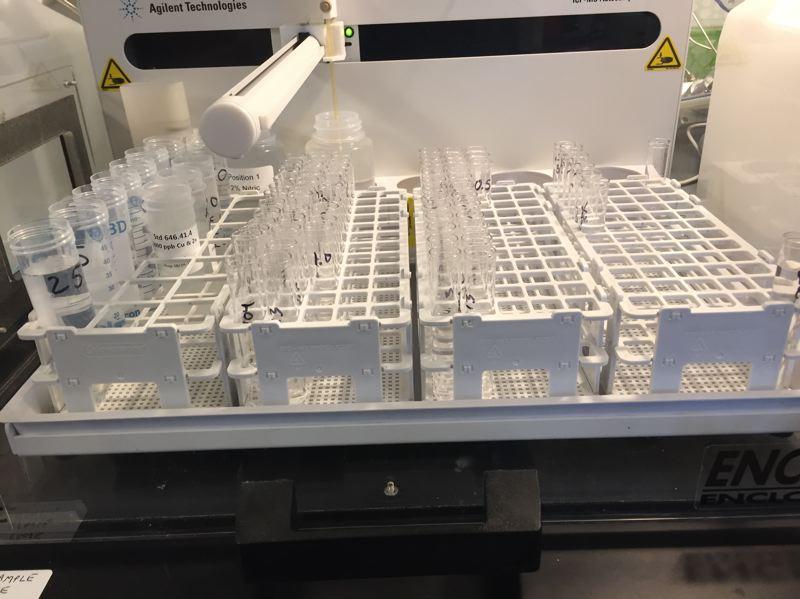The Portland Water Bureau recently detected lead in the water of certain homes at a high enough level they were required to notify the public.
The water bureau detected 21 parts per billion, 6 parts higher than EPA requirements to notify the public.
The lead was detected in homes known to have lead solder in their plumbing, and were built or plumbed between 1970 and 1985.
Officials stress the results do not represent the entire water system.
Within months, the Portland Water Bureau will have their strongest tool yet to make drinking water safer for everyone, regardless of the plumbing in their home, school and building.
In April 2022, the bureau is opening their Improved Corrosion Control Treatment Facility. With a little mineral chemistry, this facility will make Portland's water less corrosive to lead and other metals.
There is no safe level of lead exposure, especially for youths whose brains are still developing.
A D V E R T I S I N G | Continue reading below"Our concern is our customer's health and safety, and we want to make sure we let everybody know about these results," said Lead Hazard Reduction Program Manager Scott Bradway.
In a Nov. 29 release, the Water Bureau said the current test results are part of a regional monitoring program that includes the bureau and these water districts: Burlington; Lorna; Palatine Hill; Pleasant Home; Raleigh; Valley View; and West Slope
"We're really focusing on is now what can we do, as a drinking water provider to improve the levels of lead for all of our customers throughout, not just these homes with the elevated levels of lead in the drinking water, but for everybody," Bradway said.
No matter when your home was built, the water bureau everyone should test their water for lead. It's a free servicethat gets sent to your house.

Safety tips
The Portland Water Bureau, regional water providers and public health partners recommend the following easy steps you can take now to reduce exposure to lead:
A D V E R T I S I N G | Continue reading below• Run water to flush the lead out. If the water has not been used for several hours, run each tap for 30 seconds to 2 minutes or until it becomes colder before drinking or cooking. This simple step can reduce lead in water up to 90 percent or more.
• Use cold, fresh water for cooking and preparing baby formula. Lead dissolves more easily into hot water than cold water. Do not cook with or drink water from the hot water tap.Do not use water from the hot water tap to make baby formula.
• Do not boil water to remove lead. Boiling water will not reduce lead.
• Consider using a filter. Check whether it reduces lead – not all filters do. Be sure to maintain and replace a filter device in accordance with the manufacturer's instructions to protect water quality. Contact NSF International at 800-NSF-8010 or nsf.org for information on performance standards for water filters.
• Test children for lead. Ask a physician or contact the LeadLine at leadline.org or 503-988-4000 to find out how to have your child tested for lead. A blood lead level test is the only way to know if a child is being exposed to lead.
• Test your water for lead. Call the LeadLine at leadline.org or 503-988-4000 to find out how to get a FREE lead-in-water test.
A D V E R T I S I N G | Continue reading below• Regularly clean the faucet aerator. Particles containing lead from solder or household plumbing can become trapped in faucet aerators. Regularly cleaning every few months will remove these particles and reduce the exposure to lead.
• Consider buying low-lead fixtures. As of 2014, all pipes, fittings and fixtures are required to contain less than 0.25 percent lead. When buying new fixtures, consumers should seek out those with the lowest lead content.
• Know the other sources of lead exposure in our community. In Portland, the most common sources of lead exposure are lead-based paint, household dust, soil, and plumbing materials. Lead is also found in other household objects such as toys, cosmetics, and pottery.
To get your water tested for lead or for more information on reducing lead exposure around your home or building and the health effects of lead, contact the LeadLine at Leadline.orgor503-988-4000.
KOIN News 6 is a news partner of the Pamplin Media Group.
You count on us to stay informed and we depend on you to fund our efforts. Quality local journalism takes time and money. Please support us to protect the future of community journalism.









